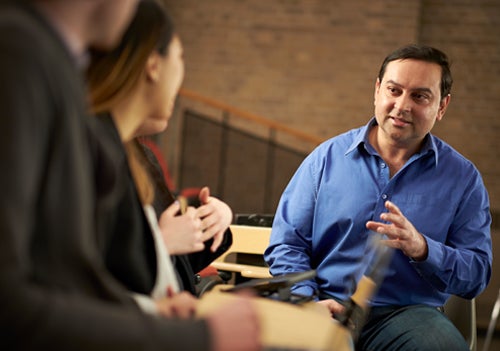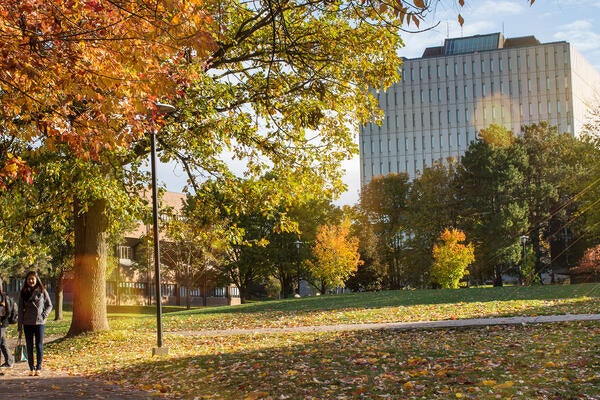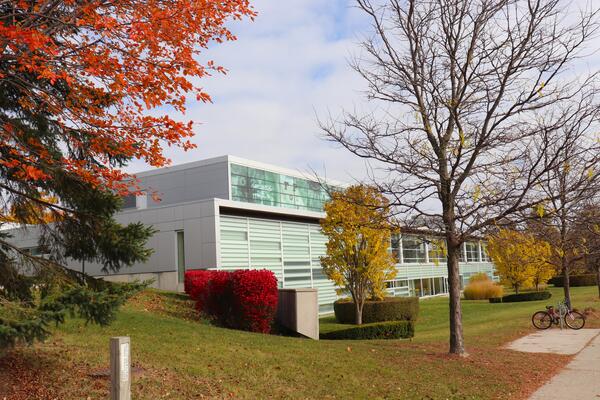
Global educator teaches in Waterloo and China
Award-winning Waterloo lecturer takes experience working on the border of Pakistan into the classroom

Award-winning Waterloo lecturer takes experience working on the border of Pakistan into the classroom
By Mirko Petricevic Marketing and Strategic CommunicationsKashif Memon navigated through complex supply chains of feudal lords and military forces to transport food from Pakistani farmers and fishermen to a Persian Gulf port and on to Britain.
Now Memon is passing on the lessons he’s learned in the real world to science and business students at the University of Waterloo. For his skill at sharing the insights he gained on Pakistan’s dangerous frontier, Memon has received a Distinguished Teacher Award for 2014.
“I want to teach students something innovative,” says Memon. “It’s important that they learn what’s going on in the field.”
Memon, who has worked for the United Nations, the World Bank and the Asian Development Bank, credits several practices for his success as a teacher:
After graduating with a bachelor’s degree in computer science, Memon entered Pakistan’s civil service. While working in various commerce and trade departments, and earning an MBA from Britain, Memon helped bolster his country’s international trade infrastructure.

He specializes in studying how global business systems, technological innovation and politics combine to affect supply chain management.
A native of Pakistan, Memon arrived at Waterloo in 2005 to be an advisor to three programs: Science and Business; Biotechnology Economics; and Biotechnology Chartered Professional Accountancy. In 2006, he started his duties as lecturer.
Memon is in Beijing for the spring term teaching at the China University of Geosciences, where Chinese students are preparing to come to the University of Waterloo for two years of study. Memon’s students are part of Waterloo’s Science 2 + 2 program, where Chinese students can get a degree from the University of Waterloo after studying here for two years.
Memon says his first priority is to build a warm relationship with his students by sharing meals and playing sports.
“I explain Waterloo’s culture and ease them through orientation sessions. By the end of second week, we are on first-name basis. I'm interested in their success and will customize their individual experiences for my courses,” says Memon.
Once the academic works begins, Chinese professors often join the class to observe and learn about University of Waterloo teaching methods. This year, enrollment in his course jumped to 22 from four last year.
“By the end of the term these students are ready to take off for Canada. They have been thoroughly challenged and tested in the classroom and know what to expect in Waterloo,” says Memon.

Read more
Innovators and entrepreneurs with Waterloo connections make the Forbes list across five future-focused categories

Read more
The renowned leaders in developmental psychology, data intelligence and quantum physics receive prestigious appointments and funding to establish research programs

Read more
Optometry professor Dr. Lyndon Jones a key member of team winning Brockhouse Canada Prize for Interdisciplinary Research in Science and Engineering
The University of Waterloo acknowledges that much of our work takes place on the traditional territory of the Neutral, Anishinaabeg and Haudenosaunee peoples. Our main campus is situated on the Haldimand Tract, the land granted to the Six Nations that includes six miles on each side of the Grand River. Our active work toward reconciliation takes place across our campuses through research, learning, teaching, and community building, and is co-ordinated within the Office of Indigenous Relations.